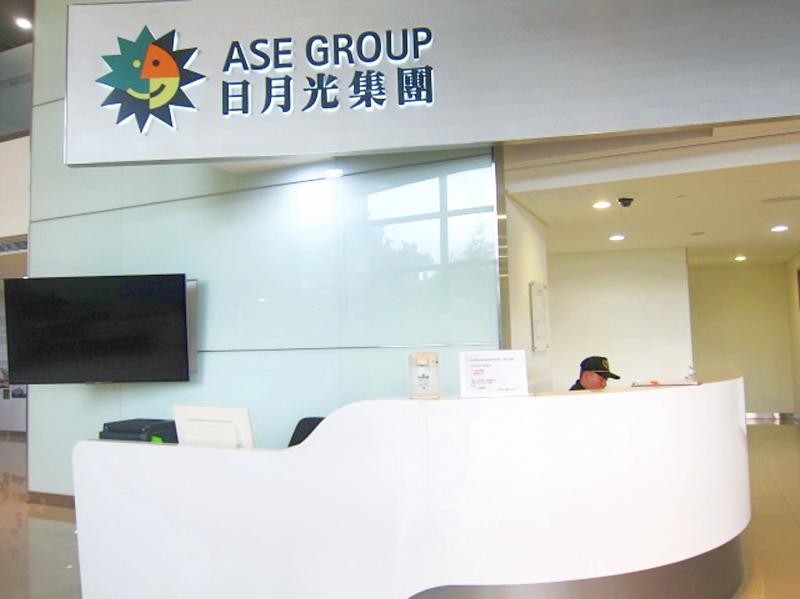ASE Technology Holding Co (日月光控股) yesterday reported that its net profit more than doubled to a record NT$14.18 billion (US$509.45 million) last quarter, as it operated near full capacity due to robust demand from the computer and communications segments.
That compared with a net profit of NT$6.71 billion a year earlier and NT$10.34 billion in the previous quarter. Earnings per share rose to NT$3.29 last quarter, compared with NT$1.57 the previous year and NT$2.4 the prior quarter.
Gross margin improved to 20.4 percent last quarter. It was 16 percent a year ago and 19.5 percent in the second quarter.

Photo: Grace Hung, Taipei Times
ASE said it expects this quarter to be “flattish,” with revenue approaching last quarter’s NT$88.79 billion, due to a shortage of wafers and substrates.
Revenue from its electronics manufacturing services (EMS), primarily its system-in-a-package (SiP) service, should increase to about NT$79.14 million from last quarter’s NT$61.12 billion, the company said.
However, the company said it would likely miss its operating profit margin target of 4 percent for the EMS business this year, due to component shortages and supply chain disruptions.
“What we are seeing is some softness in demand in certain areas, but, in general, the whole industry is still going through rapid growth,” ASE chief financial officer Joseph Tung (董宏思) told investors during a teleconference.
“Customers are seeking to secure more supply,” he said.
Factory utilization is to stay at a high level of 85 percent for its chip packaging services and 80 percent for its chip testing services, similar to last quarter’s levels, he said.
Despite noises about double booking and potential softness in end product demand, ASE said it believes there is still substantial pent-up demand.
The Kaohsiung-based company said it expects its business to continue growing next year, with a better-than-seasonal outlook for the first quarter of next year.
The company said it continues “to have strong order flows from a vast majority of our customers, with orders well extending into 2022 and some in 2023, well beyond normal booking time.”
ASE said it also expects to see a “friendly pricing environment” next year, indicating an upside for prices.

CAUTIOUS RECOVERY: While the manufacturing sector returned to growth amid the US-China trade truce, firms remain wary as uncertainty clouds the outlook, the CIER said The local manufacturing sector returned to expansion last month, as the official purchasing managers’ index (PMI) rose 2.1 points to 51.0, driven by a temporary easing in US-China trade tensions, the Chung-Hua Institution for Economic Research (CIER, 中華經濟研究院) said yesterday. The PMI gauges the health of the manufacturing industry, with readings above 50 indicating expansion and those below 50 signaling contraction. “Firms are not as pessimistic as they were in April, but they remain far from optimistic,” CIER president Lien Hsien-ming (連賢明) said at a news conference. The full impact of US tariff decisions is unlikely to become clear until later this month

With an approval rating of just two percent, Peruvian President Dina Boluarte might be the world’s most unpopular leader, according to pollsters. Protests greeted her rise to power 29 months ago, and have marked her entire term — joined by assorted scandals, investigations, controversies and a surge in gang violence. The 63-year-old is the target of a dozen probes, including for her alleged failure to declare gifts of luxury jewels and watches, a scandal inevitably dubbed “Rolexgate.” She is also under the microscope for a two-week undeclared absence for nose surgery — which she insists was medical, not cosmetic — and is

GROWING CONCERN: Some senior Trump administration officials opposed the UAE expansion over fears that another TSMC project could jeopardize its US investment Taiwan Semiconductor Manufacturing Co (TSMC, 台積電) is evaluating building an advanced production facility in the United Arab Emirates (UAE) and has discussed the possibility with officials in US President Donald Trump’s administration, people familiar with the matter said, in a potentially major bet on the Middle East that would only come to fruition with Washington’s approval. The company has had multiple meetings in the past few months with US Special Envoy to the Middle East Steve Witkoff and officials from MGX, an influential investment vehicle overseen by the UAE president’s brother, the people said. The conversations are a continuation of talks that

CHIP DUTIES: TSMC said it voiced its concerns to Washington about tariffs, telling the US commerce department that it wants ‘fair treatment’ to protect its competitiveness Taiwan Semiconductor Manufacturing Co (TSMC, 台積電) yesterday reiterated robust business prospects for this year as strong artificial intelligence (AI) chip demand from Nvidia Corp and other customers would absorb the impacts of US tariffs. “The impact of tariffs would be indirect, as the custom tax is the importers’ responsibility, not the exporters,” TSMC chairman and chief executive officer C.C. Wei (魏哲家) said at the chipmaker’s annual shareholders’ meeting in Hsinchu City. TSMC’s business could be affected if people become reluctant to buy electronics due to inflated prices, Wei said. In addition, the chipmaker has voiced its concern to the US Department of Commerce